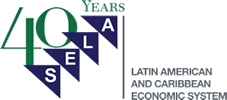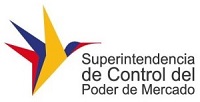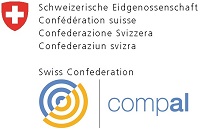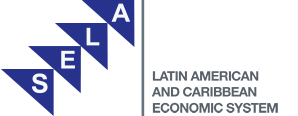AGENDA
Day 1: Wednesday, 2 December 2015
|
Time |
|
|
08:30 – 09:00 |
Registration |
|
09:00 – 09:30 |
OPENING SESSION
|
|
9:30 – 11:15 |
SESSION I: REGULATION OF COMPETITION WITHIN THE FRAMEWORK OF REGIONAL AND SUBREGIONAL INTEGRATION AGREEMENTS IN LATIN AMERICA AND THE CARIBBEAN Latin America and the Caribbean have a dense network of economic integration agreements, in which the regulation of competition plays a direct or indirect role. This session will bring together the secretariats of several regional integration agreements. Some of the issues to be discussed are:
Moderator: Telasco Pulgar, Director (a.i.) of Relations for Integration and Cooperation of the Permanent Secretariat of SELA
|
|
11:15 – 11:30 |
Coffee break
|
|
11:30 – 12:00 |
Interactive debate
|
|
12:00 – 13:30 |
Free time for lunch
|
|
13:30 – 15:00 |
SESSION II: NEW PARADIGMS IN THE REGULATION ON COMPETITION WITHIN THE FRAMEWORK OF THE REGIONAL AND SUBREGIONAL INTEGRATION AGREEMENTS IN LATIN AMERICA AND THE CARIBBEAN In line with the debates of Session I, this Session will discuss the future of the regulations on competition from the standpoint of regional integration, addressing the following issues:
Moderator: Telasco Pulgar, Director (a.i.) of Relations for Integration and Cooperation of the Permanent Secretariat of SELA.
|
|
15:00 – 15:30 |
Interactive debate |
|
15:30 - 15:45 |
Coffee break |
|
15:45 – 17:30 |
SESSION III: COMPETITION AND INTELLECTUAL PROPERTY IN THE AREA OF MEDICINES Competition policy aims to achieve that markets benefit consumers through their basic elements: the promotion and implementation of regulations. However, in order to improve access to products, the measures to fight those practices that are contrary to free competition in the sector of medicines may be less appropriate than other type of measures. Competition policy is a mechanism still relatively little developed but promising; for this reason, greater importance should be given to its potential to complement initiatives in this matter. This session will address some of the main problems related to competition currently existing in the sector of medicines, with examples from various jurisdictions as regards the benefits of the application of competition rules for consumers, and some recommendations of measures to improve access to medicines in Latin America and the Caribbean. Moderator: United Nations Conference on Trade and Development (UNCTAD)
|
|
17:30 – 18:00 |
Interactive debate |
Day 2: Thursday, 3 December 2015
|
09:00 – 10:30 |
SESSION IV: NON-TARIFF MEASURES AND THEIR IMPACT ON COMPETITION With the fall of tariffs, non-tariff measures have become the determining factor for regulation of international trade, having an important impact on integration in the global and regional networks of economic production. This session will address the impact of those measures on competition, particularly the sanitary and phytosanitary measures and the technical barriers to trade which regulate both trade and domestic production, on the one hand; and on the other hand, the protectionist measures in trade and industrial policy, as well as the measures on customs, valuation, facilitation and inspection, trade defence measures, and non-automatic licensing and quantitative restrictions, among others. Moderator: United Nations Conference on Trade and Development (UNCTAD)
|
|
10:30 – 11:00 |
Interactive debate |
|
11:00 – 11:15 |
Coffee break |
|
11:15 – 12:45 |
SESSION V: IMPACT OF THE INFORMAL SECTOR ON TRADE AND COMPETITION The informal sector is a reality in the economies of the region, which poses a challenge in maximizing the impact of public policies on trade and competition. How could the informal sector be integrated into the usual control of the authorities? What should be kept in mind when it comes to regulating trade and competition in relation to the informal trade? And particularly, how does family agriculture in Latin America affect or should affect the design of public policies on trade and competition? Moderator: United Nations Conference on Trade and Development (UNCTAD)
|
|
12:45 – 13:00 |
Interactive debate |
|
13:00 – 14:30 |
Free time for lunch |
|
14:30 – 16:00 |
SESSION VI: THE FUTURE OF THE WORKING GROUP ON TRADE AND COMPETITION: WORK PROGRAMME AND FUTURE PARTNERS In the IV Annual Meeting of the Working Group of Trade and Competition, the Member States showed unanimous interest in continuing with the work of the group. In this session, various options will be presented for consideration by the Member States, such as joint studies, ad hoc groups and search for new partners. Moderator: Christian Ruiz, General Intendent at the Superintendency for Control of Market Power of Ecuador
|
|
16:00 - 16:15 |
Coffee break |
|
16:15 – 16:45 |
CONCLUSIONS AND RECOMMENDATIONS |
|
16:45 – 17:00 |
CLOSING SESSION
|
Note:
On 4 December, side events will be hosted by the Government of Ecuador. Attendance will be left to the discretion of each participant, with the Government of Ecuador covering all accommodation and food costs during that day.










